Matt Rees's Blog - Posts Tagged "matt-beynon-rees"
Writer is pro-Palestinian and pro-Israeli
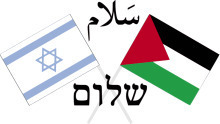 The best thing about moving from journalism to fiction writing is that people show you more respect.
The best thing about moving from journalism to fiction writing is that people show you more respect.As a journalist covering a troubling issue like the Israel-Palestinian conflict, I was often subject to rather nasty verbal attacks during public speaking engagements. For a partisan of either side, I seemed a fine target for their generalized contempt—they thought journalists were all against them and here was a live reporter on whom they could vent their spleen.
Thankfully that doesn’t happen now that I’m the author of a series of Palestinian crime novels. I wasn’t sure that it would be different, but it turns out that there’s a big change in the way people behave toward me.
Here are two examples from the last week alone.
In Cologne, Germany, last week, I talked in a bookstore at the invitation of the Cologne-Bethlehem Association. Much of the audience was made up of middle-aged and older Germans who visit Bethlehem frequently and have made strong ties with the people there.
One older gentleman suggested that, because my first novel THE COLLABORATOR OF BETHLEHEM shows the corruption and extortion carried out by the gunmen of the town during the intifada, my book “tended toward Israeli propaganda.”
But the old fellow was very respectful and as I answered him I could tell he was listening. (My response, of course, is along the lines of “No, actually the book doesn’t even address whether or not it’s right to shoot at Israelis; the book concerns itself with the negative effect those gunmen had WITHIN Palestinian society.”) Listening’s something that was often evidently not happening when, as a journalist, I would talk to audiences.
Then this week I went to the Israeli settlement of Efrat in the West Bank. I’ve visited many times before to write news reports about the confiscation of land or the endless pressure from Washington to stop building in the settlements. This time I was invited by the Gush Etzion Book Group, a few dozen women who live in the local settlements.
There had been quite some fiery debate within the group about whether to have me come and speak to them. Indeed, someone hinted that certain members of the group had stayed away.
Nonetheless, I was glad to be there. After all, much of THE COLLABORATOR OF BETHLEHEM takes place in the village of Artas and the Dehaisha Refugee Camp, which abut the northern reaches of Efrat. I want very much to talk about my books with people who have a stake in the Israeli-Palestinian struggle. Provided they’re willing to listen respectfully, to examine what I’m actually saying and not what they think I’m saying (or what they wish I’d say.)
The evening in Efrat went well and, in fact, much of what we talked about was how little I’m interested in politics—despite the apparently political subject-matter of my novels. What interests me is “the life that remains when politics is sluiced away like the filth a stray dog leaves in the street” (that’s a line from my sleuth Omar Yussef in THE FOURTH ASSASSIN, the next of my novels, which will be published Feb. 1).
Such respectful treatment is a big contrast to situations I encountered as a journalist. Then I would look out over audiences which seemed to be entirely red-faced and with arms crossed over every chest. The hostlie body language didn’t change, even though I was essentially saying the same things I’m saying now. Partisans hate journalists and, I believe, many of them used somehow to detest that I had found a kind of personal peace in covering the very conflict that stirs them up and stresses them so.
In Cologne and Efrat, people heard what I had to say and understood that I’m pro-Palestinian and pro-Israeli. I'd like all the people I know here to have a good life, not the violent situation they suffer. Politics makes people choose sides, and I want no part of that.
I also think choosing sides makes for rather bad novels. It’s in the shades of gray, where decisions are so difficult or even impossible to make, that a novel becomes truly compelling--think of Graham Greene’s best novels. Political journalism on the other hand is, to say the least, dreary. Think of the glib rubbish turned out by columnists who have to fill three op-ed spaces each week.
Who would you respect more—Graham Greene or G. Gordon Liddy? See what I mean?
So I’ll continue to talk about my books to anyone who’ll take the time to read them, because that in itself is a sign of respect and openness. Those, after all, are the qualities most needed by both sides of the Israeli-Palestinian conflict if they’re ever to find peace.
(I posted this first on a joint blog I write with some other international crime writers.)
Published on January 14, 2010 23:21
•
Tags:
bethlehem, book-groups, cologne, crime-fiction, efrat, fiction, g-gordon-liddy, graham-greene, gush-etzion, international-crime-authors-blog, israel, israelis, journalism, koeln, matt-beynon-rees, mystery-novels, omar-yussef, palestine, palestinians, politics, settlements, settlers, the-collaborator-of-bethlehem, the-fourth-assassin, west-bank
In new Palestinian crime novel NYC dangerous as West Bank
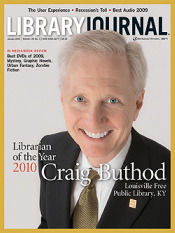 In the current Library Journal, my new Palestinian crime novel, THE FOURTH ASSASSIN (out Feb. 1) gets a good review that highlights the themes and implications beyond the resolution of the mystery. For those who have no copy of the magazine (in which case you may have missed Librarian of the Year -- Way to go, Craig Buthod of Louisville, Ky.) here's THE FOURTH ASSASSIN review: "In New York City for a UN conference, Omar Yussef goes to Bay Ridge, Brooklyn, home to a large Palestinian community, to visit his son and finds a beheaded body in his son's apartment. With no alibi, his son is arrested, and Omar finds that the streets of New York are as treacherous and dangerous as those of Bethlehem. VERDICT Journalist Rees's fourth Omar Yussef outing (after The Samaritan's Secret) exposes the political struggle among various Palestinian factions and demonstrates why it is so difficult to find a solution in the troubled region. His sleuth might miss the ancient streets of Bethlehem, but the hatred and tension of the Middle East follow the Palestinian wherever he goes."
In the current Library Journal, my new Palestinian crime novel, THE FOURTH ASSASSIN (out Feb. 1) gets a good review that highlights the themes and implications beyond the resolution of the mystery. For those who have no copy of the magazine (in which case you may have missed Librarian of the Year -- Way to go, Craig Buthod of Louisville, Ky.) here's THE FOURTH ASSASSIN review: "In New York City for a UN conference, Omar Yussef goes to Bay Ridge, Brooklyn, home to a large Palestinian community, to visit his son and finds a beheaded body in his son's apartment. With no alibi, his son is arrested, and Omar finds that the streets of New York are as treacherous and dangerous as those of Bethlehem. VERDICT Journalist Rees's fourth Omar Yussef outing (after The Samaritan's Secret) exposes the political struggle among various Palestinian factions and demonstrates why it is so difficult to find a solution in the troubled region. His sleuth might miss the ancient streets of Bethlehem, but the hatred and tension of the Middle East follow the Palestinian wherever he goes."
Published on January 19, 2010 05:37
•
Tags:
bay-ridge, bethlehem, brooklyn, crime-fiction, kentucky, library-journal, louisville, manhattan, matt-beynon-rees, middle-east, mystery-fiction, new-york, omar-yussef, palestinian, reviews, the-fourth-assassin, the-samaritan-s-secret, u-n
Matt Rees NY book reading Feb. 2
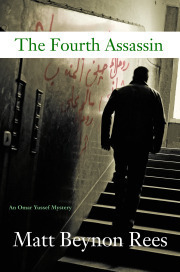 Award-winning crime writer Matt Beynon Rees reads from THE FOURTH ASSASSIN, his new novel, Feb. 2 in New York.
Award-winning crime writer Matt Beynon Rees reads from THE FOURTH ASSASSIN, his new novel, Feb. 2 in New York.The fourth installment in Matt's Crime Writers Association Dagger-winning series about Palestinian sleuth Omar Yussef is published Feb. 1. In New York for a UN conference, Omar uncovers an assassination plot. The suspect: his own son. Omar's most personal investigation so far.
Matt will read from the book Feb. 2 at 7 p.m.
Location: Partners & Crime bookstore, 44 Greenwich Avenue (note, it's on Greenwich Avenue, not Greenwich Street), in Greenwich Village, NYC
Matt Beynon Rees is the award-winning author of the Omar Yussef series. A prize-winning journalist, he has reported for 14 years from the Middle East for Time, Newsweek and British newspapers. His novels have been translated into 23 languages. He lives in Jerusalem.
Read more about THE FOURTH ASSASSIN. Watch a video about the book. Order it from amazon.com or from amazon.co.uk. For publicity contact Grace McQuade (212) 446-5101 gmcquade@goldbergmcduffie.com
Published on January 24, 2010 04:00
•
Tags:
book-tour, brooklyn, crime-fiction, crime-writers-association, greenwich-village, matt-beynon-rees, new-york, omar-yussef, palestine, palestinians, partners-and-crime, readings, the-fourth-assassin
Palestine Scene of the Crime
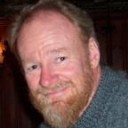 Crime writer J. Sydney Jones has a new blog called Scene of the Crime. He aims to interview writers about the impact on their writing of the location and sense of place in their novels -- usually from far-flung countries. This week he features me on my Palestinian crime novels. Read on, for the full interview.
Crime writer J. Sydney Jones has a new blog called Scene of the Crime. He aims to interview writers about the impact on their writing of the location and sense of place in their novels -- usually from far-flung countries. This week he features me on my Palestinian crime novels. Read on, for the full interview.A Different View of Palestine
Matt Beynon Rees has staked out real estate in the Middle East for his acclaimed Crime Writers Association Dagger-winning series of crime novels featuring Palestinian sleuth Omar Yussef. The books have sold to publishers in 23 countries and earned him the title “the Dashiell Hammett of Palestine” (L’Express).
His newest, The Fourth Assassin, which is out on Feb. 1, finds Yussef in New York for a UN conference and visiting his son, Ala, who lives in Bay Ridge, a Brooklyn neighborhood with a large Palestinian community. Of course murder and mayhem greet Yussef in New York, just as in Palestine, and he is ultimately forced to investigate in order to clear his son of a murder charge.
Scene of the Crime caught up with Matt in New York, where he is promoting his new book. He was kind enough to take time away from his busy schedule to answer a few questions.
Describe your connection to Jerusalem and Palestine. How did you come to live there or become interested in it?
I arrived in Jerusalem for love. Then we divorced. But I stayed because I felt an instant liking for the openness of Palestinians (and Israelis). When I arrived I had just spent five years as a journalist covering Wall Street. Frankly that exposed me to a far more alien culture than I experienced when I became a foreign correspondent in the Middle East. People in the Middle East are always so eager to tell you how they FEEL; on Wall Street no one ever talked about feelings, just figures. Rotten material for a novel, figures are. I’ve lived now 14 years in Jerusalem.
What things about Palestine make it unique and a good physical setting in your books?
Palestine is a place we all THINK we know. It’s in the news every day. Yet the longer I’ve been there, the more I understand that the news shows us only the stereotypes of the place. Terrorism, refugees, the vague exoticism of the muezzin’s call to prayer. What better for a novelist than to take something with which people believe themselves to be familiar and to show them how little they really know. To turn their perceptions around. The advantage is that I begin from a point of some familiarity – it isn’t a completely alien location about which readers know nothing. Imagine if I’d set my novels in, say, Tunisia or Bahrain. Not far from where my novels take place, but much more explanation needed because they’re rather a blank. With Palestine, I’m able to manipulate and disturb the existing knowledge of the place we all have.
Did you consciously set out to use Palestine as a “character” in your books, or did this grow naturally out of the initial story or stories?
I arrived in Jerusalem as a journalist, but I’ve felt that I’m on a vacation every day of those 14 years I’ve lived there. Every minute I spend in a Palestinian town or village, my creative senses are heightened, to the point where it becomes quite exhausting. Part of that is because of the people, the way they speak and feel. But most of it is the experience of place. The light so bright off the limestone. The smells of spices and shit in the markets. The cigarette smoke and damp in the covered alleys. It’s important to note that each Palestinian town is extremely distinctive – which might not be evident from the news. My first novel takes place in the historic town of Bethlehem. The second is in Gaza, which seems like another world. Nablus, where the third book is set is an ancient Roman town, built over by the Turks. …My new novel sees my Palestinian detective Omar Yussef come to Brooklyn. I move him around BECAUSE place is the driver of the novels. The main characters are the same; but I draw something different out of each of them by shifting them to new places.
How do you incorporate location in your fiction? Do you pay overt attention to it in certain scenes, or is it a background inspiration for you?
The texture of a Palestinian town is so rich, it ends up defining the atmosphere of the novel. With the casbah of Nablus for example: I was stuck in its old alleys during the intifada with gunfire all around, not knowing who or what might be round the next corner, and it seemed so sinister and beautiful at the same time. The locations are more than background. They’re significant because I write about Palestinian culture and society and people, in the context of a mystery. You couldn’t take my mysteries and change the names and put the Golden Gate in the background and say they were set in San Francisco. They’re the books they are because Palestine is as it is.
How does Omar Yussef interact with his surroundings? And conversely, how does the setting affect him?
Omar Yussef, my detective, is based on a friend of mine who lives in Dehaisha Refugee Camp in Bethlehem. It’s important to me that he should be a Muslim, someone who loves his traditional family life and tribe, someone who belongs very deeply to Bethlehem. That’s because I’m trying to show readers what they’re missing when they see the Palestinians only as stereotypical terrorists or victims. His reaction to the chaos around him is that of an honorable man who finally is driven to stand up against the negative forces at work in his town.
Has there been any local reaction to your works? What do local Palestinian and Israeli reviewers think, for example. Are your books in translation in Palestine, and if so, what reaction have they gotten from reviewers?
Hanan Ashrawi, a former Palestinian peace negotiator and a leading political figure, said of The Collaborator of Bethlehem that “it reflects the reality of life in Bethlehem– unfortunately.” (After all, it’s a crime novel of exceeding chaos.) I get a lot of emails from Arabs noting that I’m showing the reality of their people in a way that isn’t reflected in Arab media – which just blames Israel for everything – or in Western media, where the Palestinians are usually just stereotypes set in opposition to Israel. Translation into Arabic is a slow business – Henning Mankell sold 40 million books before he got an Arab translation last year – but I’m hopeful. Meanwhile the first book was translated into Hebrew and got good reviews. Israelis were very glad to have an opportunity to learn about life beyond the wall that they’ve built between Jerusalem and Bethlehem.
Of the novels you have written set in Palestine, do you have a favorite book or scene that focuses on the place? Could you quote a short passage or give an example of how the location figures in your novels?
In my third novel. The Samaritan’s Secret, there’s a scene in an old palace in the Nablus casbah called the Touqan Palace. This was the real palace I discovered on my first visit to the West Bank (to cover the funeral of a man who’d been tortured to death in the local jail). I finished my reporting and went for a walk about the casbah. I’d heard about the Touqan Palace and a friendly Palestinian helped me find it. We shouldered open the door, climbed through the goat pen inside, and came into a courtyard strung with cheap laundry and with chickens living in the ornate fountain at the center. The wealthy family that built the palace had moved to a new place up the hillside; now the palace was home to poor refugees. It struck me very powerfully as a political irony. But I also loved the stink of the chickens and the way the goats nuzzled at me and the children who lived there came through the dust to chat with me. I tried to get that feeling of a people estranged from their history into the novels through Omar Yussef, who’s a sleuth but also a history teacher. So the scenes in the Touqan Palace are quite pivotal, thematically, for me.
Who are your favorite writers, and do you feel that other writers influenced you in your use of the spirit of place in your novels?
I love Paul Bowles (The Sheltering Sky, Let it Come Down). He used to travel the Arab world and, each day, would incorporate into his writing something that had happened the previous day as he journeyed. That’s a technique I’ve used. It makes you look sharply at the emotions you experience when you’re in a strange place. In some ways it was most useful when I wrote The Fourth Assassin, which is set in Brooklyn. I know New York very well but I made a great effort to see the place as a new immigrant or a total foreigner might. I discovered that it was daunting and oppressive and crowded and huge and threatening and cold as hell – it actually made me a little depressed. Which was the point of doing my research that way. I think of it as method acting for writers.
Visit Matt at his homepage, and also on his blog. Thanks for the insightful comments, Matt, and good luck with the new book.
Published on February 02, 2010 07:09
•
Tags:
bethlehem, brooklyn, crime-fiction, exotic-fiction, gaza, golden-gate, interviews, israel, j-sydney-jones, jerusalem, matt-beynon-rees, middle-east, nablus, new-york, omar-yussef, palestine, palestinians, san-francisco, the-fourth-assassin, writing
Wall St Journal on 'The Fourth Assassin'
While in New York this last couple of weeks, I stopped into the space-age HQ of Rupert Murdoch's News Corp on the Avenue of the Americas in Midtown Manhattan. Once my eyes had adjusted to the superbright white light everywhere, I settled into a studio for an interview with Jon Friedman (the man known around NY as "Mister Media") to talk about how I researched my new novel THE FOURTH ASSASSIN.
Published on February 09, 2010 05:24
•
Tags:
book-research, brooklyn, jon-friedman, marketwatch, matt-beynon-rees, middle-east, new-york, omar-yussef, the-fourth-assassin, the-wall-street-journal, travel, video, writing
Jerusalem Zoo: Penguins before pols
Here's a whimsical video explaining why the Jerusalem Biblical Zoo is the best vantage point from which to observe the Palestinian-Israeli conflict -- superior even than a Gaza refugee camp or an Israeli military base. Seriously. And yet not.
Published on February 11, 2010 00:55
•
Tags:
animals, arabs, crime-fiction, fish, global-post, israel, israeli-palestinian-conflict, jerusalem, jerusalem-biblical-zoo, journalism, leopards, lions, matt-beynon-rees, middle-east, palestine, penguins, politicians, politics, sara-sorcher, terrorism, tigers, ultra-orthodox-jews, video
The Daily Beast and The New York Times
 My new Palestinian crime novel THE FOURTH ASSASSIN is one of five "This Week's Hot Reads" on The Daily Beast, which is also the hot read of the web these days. The Beast says of my book and its Brooklyn setting: "Rees paints a meticulous portrait of the post-9/11 community of Little Palestine and the tension of cultures trying to co-exist."
My new Palestinian crime novel THE FOURTH ASSASSIN is one of five "This Week's Hot Reads" on The Daily Beast, which is also the hot read of the web these days. The Beast says of my book and its Brooklyn setting: "Rees paints a meticulous portrait of the post-9/11 community of Little Palestine and the tension of cultures trying to co-exist."Meanwhile, The New York Times Book Review highlights the paperback release of my previous novel THE SAMARITAN'S SECRET in its Paperback Row column, calling the book "provocative and humane." Seems The Times'd rather print a nice photo of me than one of Jimmy Carter, too. Well, the old boy had his time in the sun.
Published on February 13, 2010 23:31
•
Tags:
9-11, bay-ridge, brooklyn, crime-fiction, jimmy-carter, little-palestine, matt-beynon-rees, new-york, new-york-times-book-review, paperback-row, the-daily-beast, the-fourth-assassin, the-samaritan-s-secret
From Hitler History to Mahler Mystery: J. Sydney Jones’s Writing Life
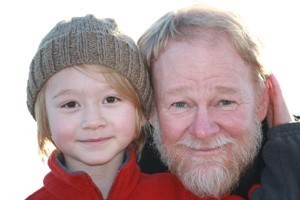 Some authors exude the pleasure of reading and writing (and, believe me, when you meet them, you’d be surprised how many just don’t.) J. Sydney Jones is such a writer, with a breadth of writing experience in an array of genres that’s highly impressive and carries with it an obvious love of his craft. His Viennese Mystery series is a fascinating way to delve into one of Europe’s loveliest, most cultured cities – and damned entertaining, too. He’s also the man behind a great new blog Scene of the Crime, which focuses on the role of place in crime fiction – check out Syd’s interview with Berlin noirmeister Philip Kerr. Here Syd discusses his career and his ideas about writing.
Some authors exude the pleasure of reading and writing (and, believe me, when you meet them, you’d be surprised how many just don’t.) J. Sydney Jones is such a writer, with a breadth of writing experience in an array of genres that’s highly impressive and carries with it an obvious love of his craft. His Viennese Mystery series is a fascinating way to delve into one of Europe’s loveliest, most cultured cities – and damned entertaining, too. He’s also the man behind a great new blog Scene of the Crime, which focuses on the role of place in crime fiction – check out Syd’s interview with Berlin noirmeister Philip Kerr. Here Syd discusses his career and his ideas about writing.How long did it take you to get published?
I started out in journalism, so I had a sense of accomplishment right off, publishing my travel pieces in newspapers and magazines all over the place. Books are a different animal, but again I went with travel first and had some good early success with walking, hiking, and cycling guides. I wrote eight novels, though, before I got my first one, Time of the Wolf, published.
With the current “Viennese Mystery” series, things were easier. I had a bit of an author platform with several well-received books about Vienna and an agent who is most savvy. First query landed us the book deal.
Would you recommend any books on writing?
Tried and trusted here: you can look a lot further and do a lot worse than E.M Forster’s Aspects of the Novel. Another classic is Percy Lubbock’s The Craft of Fiction. These will not be everyone’s cup of tea, but I just love the erudite discussions in both.
What’s a typical writing day?
I get to work about nine in the morning after I drop my son off at school. I try to devote the first hours of the writing day to the current fiction project--currently the fourth book in the Viennese Mystery series. Then some exercise--tennis, if I am lucky--and lunch, followed by more mundane freelance stuff in the afternoon that also helps to pay the bills.
Plug your latest book. What’s it about? Why’s it so great?
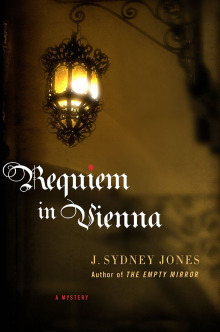
Each of the books in the Viennese Mystery series features a famous historical figure of Vienna 1900. Requiem in Vienna focuses on musical Vienna: the composer Gustav Mahler is the target of an assassin and my protagonist, the lawyer and private inquiries man, Karl Werthen, is hired to protect him. The books are a blend of historical whodunit and literary thriller with more than a dash of historical/cultural/food lore thrown in.
Here’s what a Kirkus Reviews critic had to say of the current series installment: “Sophisticated entertainment of a very high caliber.”
How much research is involved in each of your books?
There are decades of research in the books. Explanation: I started researching Vienna 1900 long ago for my book, Hitler in Vienna. Since then I have continued to read heavily in the period, but for each book I still need to bone up on the historical folks I am featuring. Some writer once said that research was sort of like writing without the creative sweat. I enjoy the research; I probably commit about three months to each before I even begin the plotting. And thank whomever for the Internet--I can even get full editions of Viennese papers of the time online.
Where’d you get the idea for your main character?
Karl Werthen is a successful lawyer and sometimes inquiry agent, an assimilated Jew, and a distinct Viennophile. And I haven’t got a clue to where he comes from, other than a shared love for Vienna. He just appeared full-formed on the first page of The Empty Mirror, the initial in the series. A minor character, he elbowed his way to the forefront by the end of the first draft; the series concept actually had the real-life father of criminology, Hanns Gross, as the protagonist. A crusty old curmudgeon, Gross tugs Werthen away from his safe wills and trusts gig back into criminal law in that first one, to prove the artist Gustav Klimt innocent of murdering his model. But it just worked out so much better to use Werthen as my lead and Gross, the pompous pro, as the sometimes sidekick.
What’s your experience with being translated?
Somewhat odd. For example, my Hitler in Vienna was first published in Germany. I originally queried publishers there in German, and it was bought sight unseen (Hitler, at the time, was a hot topic). When they received my doorstopper of a manuscript in English and realized it needed to be translated, they were none too pleased. But they sucked it up and published anyway.
Then when trying to sell the English-language rights, I had a hell of a time convincing editors in England and the U.S. that no, they would not have to have the book translated. I already had the English original of the manuscript.
What books have influenced you?
As a young man I loved the lyricism of Steinbeck. Lee from East of Eden is still one of my favorite fictional characters. And of course there was Hemingway and Fitzgerald. Then during the almost twenty years I lived in Vienna, I became an avid reader of nineteenth- and twentieth-century British authors. Blame it on the British Council. A wonderful resource in its day with massive armchairs around a humming ceramic stove. Thomas Hardy became my literary hero; I open one of his novels and begin reading his scene-setting on some desolate heath in the south of England, and I get actual chills. The language just works for me. And Conrad. Don’t even get me started on Conrad--and the bugger wrote in a second language! A guilty pleasure also became the works of J.B. Priestley, especially his Good Companions.
Did these books influence my writing? Who knows, but they surely have made my life fuller. Le Carre, of course, pushed me in new ways with dialogue and plot, as did the early fiction works of Paul Theroux (Saint Jack, Picture Palace). I wish I could make my dialogue sparkle and crack they way those guys do. But this catalogue could go on for some time. Basta.
Thanks, Syd. Fascinating insights.
Thanks for the opportunity to chat, Matt.
Published on February 18, 2010 02:11
•
Tags:
aspects-of-the-novel, austria, berlin, berlin-noir, crime-fiction, e-m-forster, exotic-fiction, fitzgerald, gustav-mahler, hemingway, hitler, interviews, j-sydney-jones, john-le-carre, joseph-conrad, karl-werthen, matt-beynon-rees, paul-theroux, percy-lubbock, philip-kerr, requiem-in-vienna, scene-of-the-crime, steinbeck, the-craft-of-fiction, vienna, writing-life
Literary reviews: If you can’t say something nice…
That’s not because of any insecurity about my writing. If a review is bad, I know the reviewer got it wrong. It’s the mere existence of negative thoughts about me and my work floating around out there, even if it’s only an aside in an otherwise positive review – that’s what makes my lunchtime hummus taste like cement.
It’s a feeling highlighted by the gratitude of a good review and the sheer love felt for the writer of a really glowing review. Right now, for example, I’m quite in love with Joe Hartlaub, reviewer for Bookreporter.com. A couple of days ago, Joe published a review of THE FOURTH ASSASSIN, my latest Palestinian crime novel. He wrote:
“Matt Beynon Rees, a Welsh journalist living in Jerusalem, writes a series known as the Omar Yussef Mysteries. If you pick up anything at all that is bound between two covers, you should be buying and reading them even if you hate mysteries. If you happen to like mysteries, please read THE FOURTH ASSASSIN, the latest Yussef novel, and recommend it to an unenlightened friend.”
You’re very kind, good sir. But wait, Joe goes on:
“Take a look at the first four pages or so. The book begins with Yussef, newly arrived in the United States, climbing the stairs of the Fourth Avenue subway exit in Brooklyn in the heart of Little Palestine. Much is familiar, and much is different. I may have read better written passages recently, but I don’t think I have read any that I have loved as much as the ones contained in these opening pages. This is classic work that will stand up 20 or 30 years from now when you (maybe) and I (almost certainly) are gone, and the problems that currently exist will still remain. Brilliantly conceived and beautifully written, THE FOURTH ASSASSIN is strongly recommended.”
Thirty years? Joe, may you live to 120.
My delight in this review isn’t the same as kick my two-year-old gets when I tell him he’s the most handsome boy in the world. No, it’s rather that someone has chosen to do exactly what I try so hard to do day by day – to be positive.
And being positive about a book seems strangely hard for people to do.
Many reviews, positive ones in particular, measure out the encouraging phrases as if they were sugar to a diabetic.
Truly negative reviews, of which I’ve only really had one, seem entirely a reflection of an almost psychopathic need to be both right and a little cruel at the same time. (That’s why Alain de Botton famously fumed when he received such a review for his book a year ago. Someone was being a smartass at his expense, and in a forum where he felt he had no comeback. Like being sassed by a cool kid at school when you’re unable to talk back.) There’s also a degree of showing off in a negative review which always makes them deeply suspect, in my opinion – was this a bad book, or simply something about which our reviewer needs to show himself to be the most knowledgeable fellow in the world?
Few writers these days claim to never read reviews. But it’s a dangerous pastime, particularly with the plethora of blogs and even reader reviews on amazon.com. Reviews on amazon are mostly conscientious, but every book seems to have at least one review on that site which begins “I couldn’t get past the first chapter, don’t know why, maybe it was just me, but I gave the whole book only one star anyway.”
A couple of years ago I decided never to write a negative review. I was sure that in a karmic way it’d come back to haunt me. I expressed this view to a literary editor who had sent me a true stinker for review. He twisted my arm; I wrote the review; something mildly unpleasant happened soon after. I know why. It won’t happen again.
Published on March 07, 2010 07:16
•
Tags:
alain-de-botton, amazon-com, blogs, bookreporter-com, brooklyn, crime-fiction, jerusalem, joe-hartlaub, kingsley-amis, literary-reviews, little-palestine, matt-beynon-rees, mysteries, mystery-fiction, omar-yussef, reviews, the-fourth-assassin, united-states, wales
Bibi’s Bedtime Book: The Secret Diary of Prime Minister Netanyahu #2
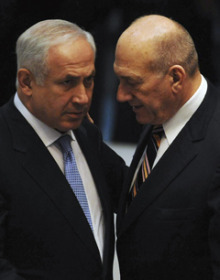 I can’t believe the extent of the corruption being uncovered in Israel’s government.
I can’t believe the extent of the corruption being uncovered in Israel’s government.My predecessor as Prime Minister drifted home from vacation yesterday – without any envelopes stuffed with cash, as far as we know -- and made a mopey statement about yet another investigation into bribery and fraud and breach of trust on his part. He’s alleged to have been in cahoots with a bunch of shady property developers, lawyers and municipal officials, so that a big, tacky building could be put up in southern Jerusalem to provide luxury dwellings for property developers and lawyers. Oh, and the former State Prosecutor, too – apparently she has an apartment there. I don’t draw any conclusions from that, though. I'm not an investigator. I just run the country.
It looks like poor old Champagne Ehud is broken by his long ordeal. Finally. He’s been brazening it out, but there are limits to the shamelessness even of an Israeli politico. If only he’d done what I did – go to the U.S., spin out some waffle about the Middle East strategic outlook, throw in a few phrases of steely determination that the Holocaust shan’t happen again (as if anyone would expect the former Israeli Prime Minister to say, ‘Well, why not? It's been a while. Let’s have another Holocaust.’), and charge them fifty grand to listen to it while they eat their shrimp. Their chicken, I mean.
Who needs corruption, when you have a public speakers’ circuit for former politicians?
By the same token, why does Tony Blair insist on keeping his job as Mideast envoy of the Quartet? It’ll take more than a skeletal smile and a familiar glottal “t” in the middle of the word “wha’ever” to extract a Nobel Peace Prize out of this place, I can tell you. What does he need such grief for? He’s one of the best paid speakers in the world (200,000 pounds for a half-hour speech, and 15 million pounds in two years since leaving Number 10.) Forget the Mideast, Tony. Creep off to the U.S. and stay there. After all, that’s the only place in the world where they think the “Prime Minister of England” is a relative of the Queen. It’s probably why they’re paying you the big money. It certainly can’t be because you were so stupid you allowed George W. Bush to fool you into going to war.
Once you’re at the top in politics, you never have to pay for dinner again. But it’s a mistake to think you don’t have to pay for your house. You just don’t have to WORK to pay for your house. A few dates in Chicago, Los Angeles, New York and Florida and I was well on the way to the cost of my villa in Caesarea. That’s what poor old Champage Ehud forgot.
That reminds me, I must send over a few Cubans to him. He's a big afficionado, but he might be running low. He’ll need them, given how much smoke he’s going to have to blow to cover all this up.
The real speaker’s fees are only for the top guys. The Prime Ministers whose reputations were soiled by Iraq, the Presidents who soiled their intern’s dress, the former US Secretaries of State who were so stupid even George W. Bush could fool them into going to war in Iraq, the …uh, the movie stars (Nicole Kidman got $435,000 to speak to a global business conference) who can teach us how to cry without having our nose-jobs run and still look fabulous.
Maybe I could look up Kidman’s speech on Youtube. I might be able to figure out how to use some of it for next year’s Holocaust Remembrance Day speech – this week at the memorials I feel I was a bit “same same,” having used up my best stuff at Auschwitz a couple of months ago. Nicole was very good in “Moulin Rouge!” Sometimes I dress as a woman and sing “One Day I’ll Fly Away” to my wife Sara, but she doesn’t seem to get the message. The messages, I mean.
Yes, speaking fees are where it’s at. Small fry have to promote themselves by writing blogs and op-eds, and even authoring their own books, as if ghost writers didn't exist. Like that writer Matt Beynon Rees. I heard that sometimes he even speaks to people for nothing, just because they want to hear him and he wants to talk about his books.
Now that’s really corrupt.
Published on April 16, 2010 06:14
•
Tags:
chicago, corruption, crime, crime-fiction, cubans, florida, george-w-bush, holocaust, iraq, israel, los-angeles, matt-beynon-rees, middle-east, moulin-rouge, netanyahu, new-york, nicole-kidman, nobel-peace-prize, olmert, one-day-i-ll-fly-away, tony-blair



